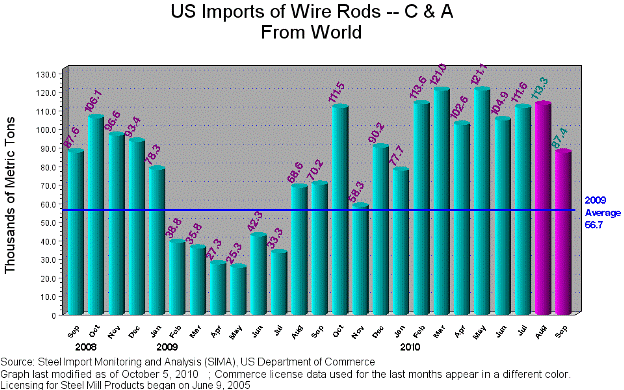Even though domestic wire rod mills are struggling with their last price increase, import offers are still being largely ignored.
Spot prices for domestic wire rod are still soft, as the growing certainty of a scrap price decrease this month has put buyers in a strong negotiating position. Official asking prices are still in the range of $33.00-$34.00 cwt. ($728-$750/mt or $660-$680/nt) ex-mill, but transactions are regularly being concluded for about $1.50 cwt. ($33/mt or $30/nt) less. Despite the discounts, purchasing activity is tepid, especially for construction-related products such as mesh that will soon face the annual winter slowdown.
Typically, foreign mills try to take advantage of unpopular price increases in the US, but import prices have remained relatively stable for over a month. Turkish wire rod offers, for example, are still in the approximate range of $30.00-$31.00 cwt. range ($661-$683/mt or $600-$620/nt) duty paid FOB loaded truck in US Gulf ports-not much lower than US spot prices. However, wire rod prices have dropped in the local Turkish market, and announcements regarding import offer decreases are expected soon.
The last time the price spread between domestic and imported wire rod was attractive enough for US buyers to take the risk of long lead times (around June), import levels surged-but as the margin narrowed, US wire rod buyers turned increasingly to domestic product. The results are evident in license data from the US Import Monitoring and Analysis System (SIMA), which show that the US imported only 87,479 mt of wire rod in September, the first time tonnage levels didn't reach the 100,000 mark since February 2010. Tonnage levels from Canada remained about the same from August to September, at 32,751 mt (preliminary census data) and 31,134 mt respectively, but Turkey exported significantly less to the US last month: 12,947 mt compared to 27,590 mt in August. The US also imported less from Mexico and Japan (9,862 mt and 7,826 mt respectively) last month. However, the US brought in significantly more month-on-month from Brazil: the 10,530 mt imported in September is significantly more than the 3,761 mt the previous month.
